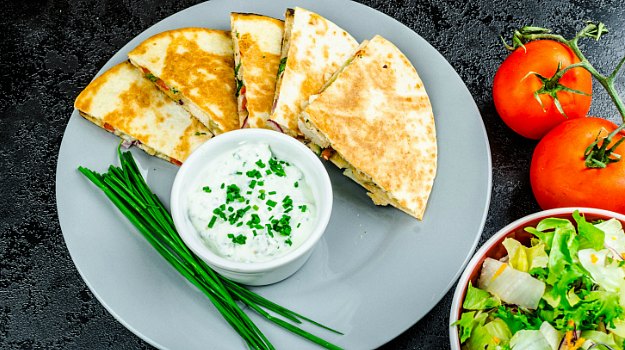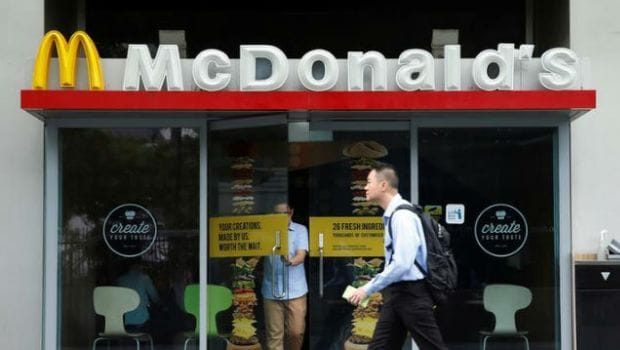US fast-food giant McDonald’s will sell a controlling stake in its China and Hong Kong business for up to $2.08 billion to a consortium including state-owned Citic and the Carlyle Group, it was announced Monday.The deal is part of an international turnaround plan by the Golden Arches as it struggles with sluggish growth at home.Citic Limited, Citic Capital Holdings, Carlyle Group and McDonald’s will form a company that will act as a franchisee for the chain’s business in mainland China and Hong Kong for 20 years, the companies said in a joint statement.
Citic is a vast Chinese state-owned conglomerate with interests in businesses ranging from energy and manufacturing to real estate.It said in a statement to the Hong Kong Stock Exchange that the purchase would deepen its exposure to China's consumer sector, "which is poised to be the main driver of China's economy for decades to come".The burger chain last year announced plans to sell its over 2,600 restaurants in China and Hong Kong, after sales took a hit as tensions in the South China Sea dented US companies' earnings in the country.Its China business also suffered a blow in 2014 after a food safety scandal involving one of its meat suppliers.The deal gives McDonald's partners "who have an unmatched understanding of the local markets and bring enhanced capabilities", CEO Steve Easterbrook said in the statement.
Citic and Citic Capital will have a stake of 52 percent, Carlyle will take 28 percent and McDonald’s will retain 20 percent of the new company.It will focus on growth in China's smaller regional cities and plans to open more than 1,500 restaurants in the mainland and Hong Kong over the next five years.“Citic and Carlyle’s resources will allow McDonald’s to expand rapidly and refurbish old restaurants, which is expensive to do,” Ben Cavender of China Market Research Group told Bloomberg News.“Given that McDonald’s lags behind KFC in terms of store count in China, we can expect them to expand aggressively and invest heavily.”- Global overhaul -The Illinois-based burger chain has been overhauling its global structure under Easterbrook to compensate for slower growth in markets such as France and the US, its largest market.The global restructuring plan calls for refranchising 4,000 restaurants by the end of 2018, with the long-term goal of franchising 95 percent of its outlets.The new company will focus on menu innovation and enhanced restaurant convenience, and McDonald's existing management team will continue to lead the business, the statement said.McDonald's opened its first restaurant in mainland China in 1990 and currently employs over 120,000 people, it said, adding that the fast-food chain is the country's second-largest.It was one of the largest-ever China deals for asset manager Carlyle, which has invested more than $7 billion of equity in the world's second-largest economy, according to the statement.The deal is expected to be closed in mid-2017 pending regulatory approval.Investors appeared to welcome the deal, as shares of Citic Limited closed up 1.24 percent on the Hong Kong exchange Monday.Rival Yum Brands, owner of KFC, Pizza Hut and Taco Bell, last year split off its $6.9 billion China business into a separate company, Yum China, to focus on its huge but struggling restaurant empire in the country. (This story has not been edited by NDTV staff and is auto-generated from a syndicated feed.)
Citic is a vast Chinese state-owned conglomerate with interests in businesses ranging from energy and manufacturing to real estate.It said in a statement to the Hong Kong Stock Exchange that the purchase would deepen its exposure to China's consumer sector, "which is poised to be the main driver of China's economy for decades to come".The burger chain last year announced plans to sell its over 2,600 restaurants in China and Hong Kong, after sales took a hit as tensions in the South China Sea dented US companies' earnings in the country.Its China business also suffered a blow in 2014 after a food safety scandal involving one of its meat suppliers.The deal gives McDonald's partners "who have an unmatched understanding of the local markets and bring enhanced capabilities", CEO Steve Easterbrook said in the statement.
Citic and Citic Capital will have a stake of 52 percent, Carlyle will take 28 percent and McDonald’s will retain 20 percent of the new company.It will focus on growth in China's smaller regional cities and plans to open more than 1,500 restaurants in the mainland and Hong Kong over the next five years.“Citic and Carlyle’s resources will allow McDonald’s to expand rapidly and refurbish old restaurants, which is expensive to do,” Ben Cavender of China Market Research Group told Bloomberg News.“Given that McDonald’s lags behind KFC in terms of store count in China, we can expect them to expand aggressively and invest heavily.”- Global overhaul -The Illinois-based burger chain has been overhauling its global structure under Easterbrook to compensate for slower growth in markets such as France and the US, its largest market.The global restructuring plan calls for refranchising 4,000 restaurants by the end of 2018, with the long-term goal of franchising 95 percent of its outlets.The new company will focus on menu innovation and enhanced restaurant convenience, and McDonald's existing management team will continue to lead the business, the statement said.McDonald's opened its first restaurant in mainland China in 1990 and currently employs over 120,000 people, it said, adding that the fast-food chain is the country's second-largest.It was one of the largest-ever China deals for asset manager Carlyle, which has invested more than $7 billion of equity in the world's second-largest economy, according to the statement.The deal is expected to be closed in mid-2017 pending regulatory approval.Investors appeared to welcome the deal, as shares of Citic Limited closed up 1.24 percent on the Hong Kong exchange Monday.Rival Yum Brands, owner of KFC, Pizza Hut and Taco Bell, last year split off its $6.9 billion China business into a separate company, Yum China, to focus on its huge but struggling restaurant empire in the country. (This story has not been edited by NDTV staff and is auto-generated from a syndicated feed.)
Advertisement









